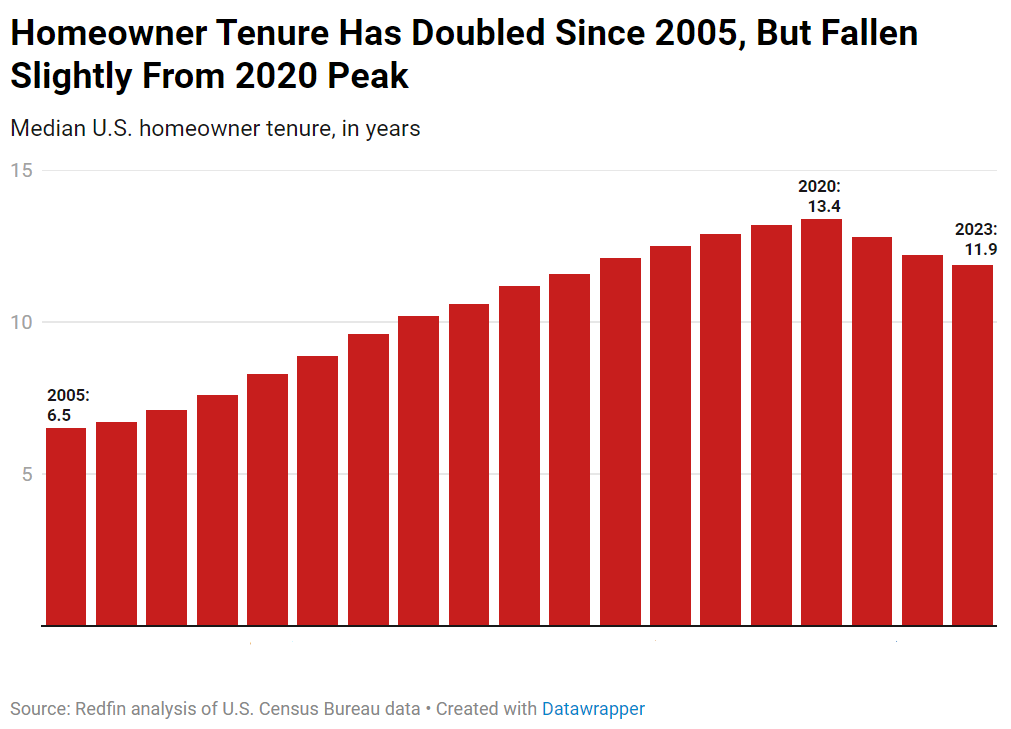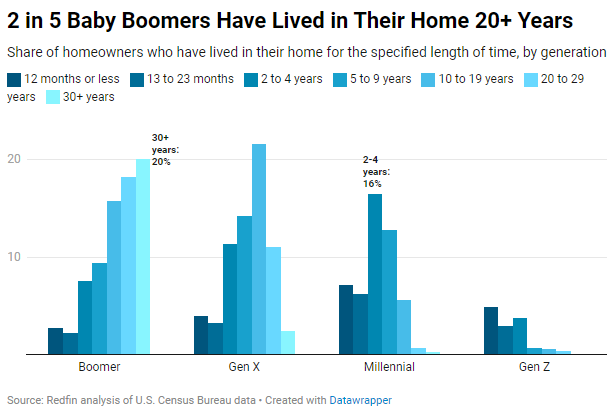The typical U.S. homeowner has spent 11.9 years in their home, up from 6.5 years two decades ago.
Homeowner tenure peaked at 13.4 years in 2020, just when the pandemic set off a moving frenzy, and has declined since then.

This data is from a Redfin analysis of median homeowner tenure by year in the U.S. as of 2023, using historical county records. Home tenure for 2023 is defined as the number of years between the most recent sale date of a home and December 1, 2023. Data on homeowner tenure by generation is from a Redfin analysis of the U.S. Census Bureau’s 1-year American Community Survey in 2022, the most recent year for which the data is available.
Older Americans staying in their homes is the driving force behind longer homeowner tenure. Nearly 40% of baby boomers have lived in their home for at least 20 years, and another 16% have lived in their home for 10-19 years. For Gen Xers, more than one-third (35%) have lived in the same home for at least 10 years.
Millennials typically stay in homes for shorter periods, largely because they’re younger and partly because they switch jobs more than older generations. Less than 7% of millennials have lived in their home for 10 years or longer, 13% have lived in their home for 5-9 years, and 30% have lived in their home for less than five years. Nearly all Gen Zers who own a home have had it for less than five years, which stands to reason because the oldest Gen Zer was 26 in 2023.

The time periods for each generation noted in the chart above don’t add up to 100%. That’s because not everyone owns a home; the remainder are either renters or living in institutions like assisted living facilities.
Baby boomers and Gen Xers have an outsized impact on overall housing-market trends for a few reasons. One, the American population is aging: Roughly 17% of people in the U.S. were 65 and older as of 2020, up from 13% in 2010. Two, they’re most likely to own homes: Nearly 80% of baby boomers and 72% of Gen Xers own their home, compared to 55% of millennials and 26% of Gen Zers.
There are several reasons why homeowner tenure has increased since the early aughts:
Lack of homes for sale and high housing costs contributes to people staying in their homes longer, and people staying in their homes longer contributes to lack of inventory and pushes prices higher.
Long homeowner tenure, particularly among baby boomers, is an obstacle for young first-time buyers trying to break into the market. A recent Redfin analysis found that empty-nest baby boomers own twice as many three-bedroom-plus homes than millennials with kids. Some young families are turning to new construction, and others are renting homes.
Homeowner tenure has declined slightly each year since 2020 because the pandemic kicked off a moving frenzy, with remote work and record-low mortgage rates leading to more homes changing hands in 2021 than any year since 2006.
Moving forward, we expect homeowner tenure to stay flat or increase slightly for the foreseeable future. Existing-home sales hit a 15-year low last year, with many homeowners locked in by low mortgage rates, and while sales should pick up a bit this year, it’ll be more of a trickle than a flood.

